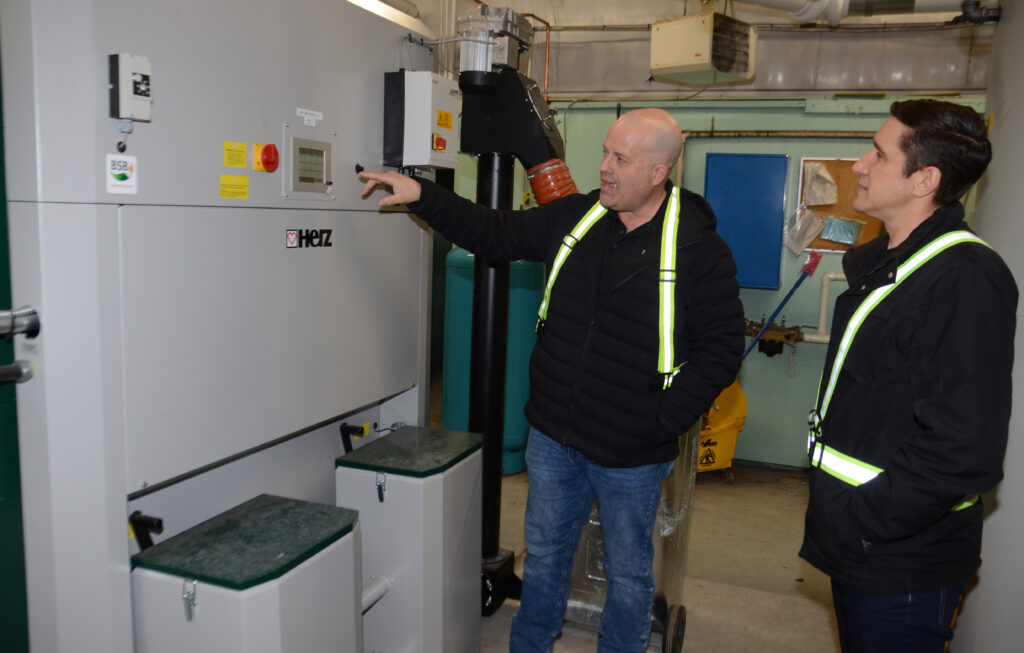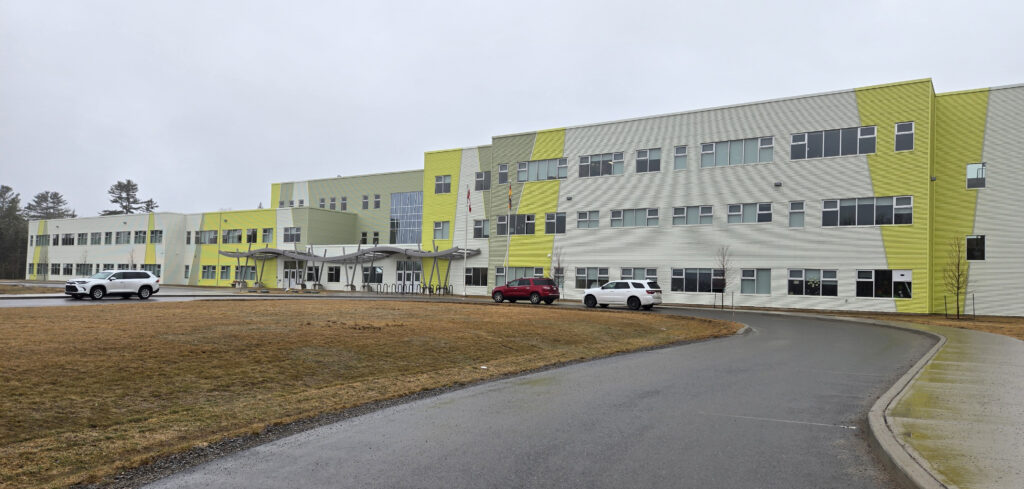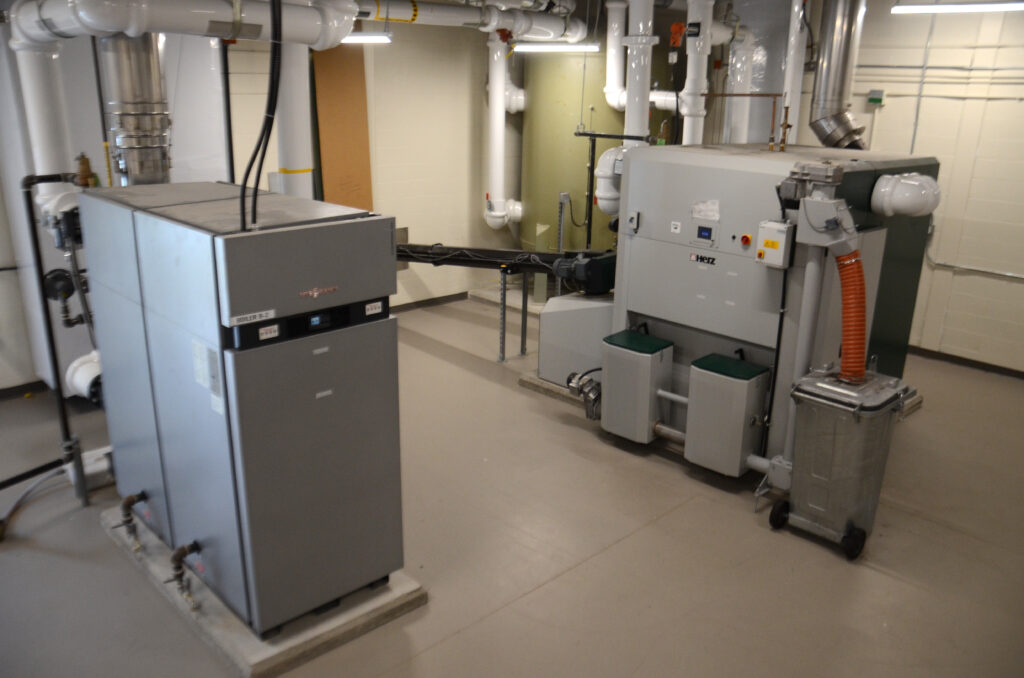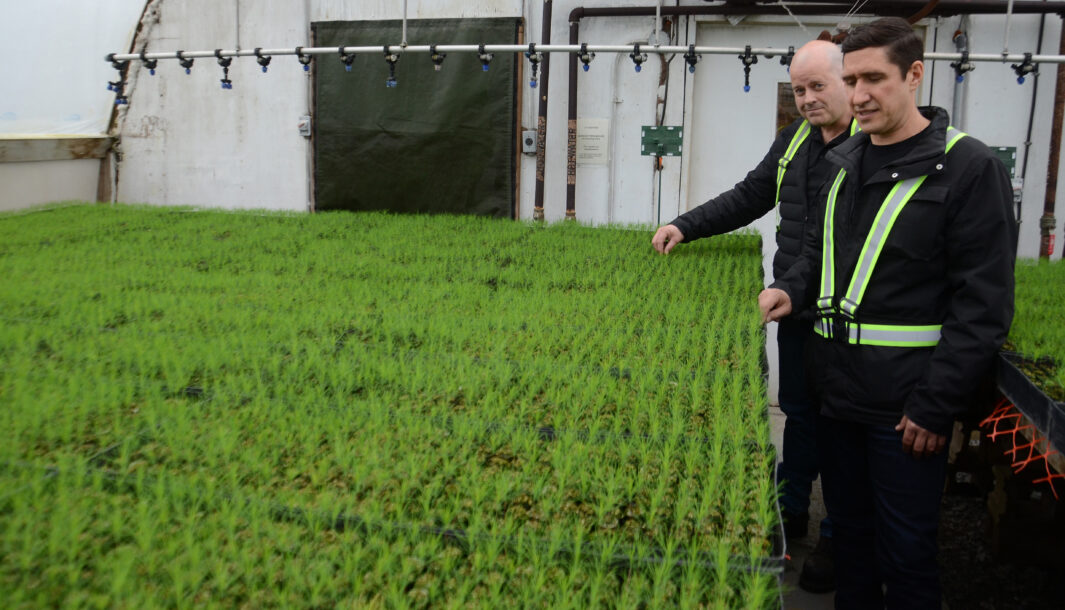Two new installations for Biomass Solutions Biomasse (BSB) at Kingsclear Tree Nursery and nearby Hanwell Park Academy school use low-carbon, locally sourced wood pellets to help reseed tomorrow’s forests and educate future community leaders in central New Brunswick.
“We’re helping to fuel the future… At the nursery, it’s the full cycle, growing trees and using waste wood to help them grow. At the school, we provide a low-carbon heat source for New Brunswick children who will need a society less dependent on non-renewable energy,” said Jonathan Levesque, BSB General Manager. “The potential of biomass to help our future in Canada is bigger than people imagine.”
Making the Switch from Fossil Fuels
The New Brunswick Climate Change Action Plan aims to reduce the use of fossil fuels in public buildings. The province decided to tender a low-carbon biomass heating system retrofit at the nursery.
The Kingsclear Tree Nursery, located in Island View on the outskirts of Fredericton, grows and ships approximately 19-20 million tree seedlings annually for reforestation on Crown land and private woodlots. Martin Noël, Nursery Manager, said the BSB installation replaced numerous oil-fired boilers, including some equipment that was more than 45 years old.
“We had redundancies, so we have more than one boiler in case one went down… Today, we still have redundancies and oil boilers to help with the peak heating,” Noël said. “In the winter, we are trying to maintain overnight temperatures of 23 degrees (C) when the outside temperature can be as low as minus 25 degrees (C).”
Noël said the project was tendered in the summer of 2024 and completed in time to be fired up in February. The installation included reinforced concrete pads, new buffer tanks, new external silos and new exhaust flues.
“The system is new to us, and over time, we will get a good sense of fuel consumption and pellets…. This year will be a good testament to that,” he said.
Three Herz Firematic 350 wood pellet boilers were installed at the nursery in separate heated greenhouse complexes. The Herz boilers are designed to be compact and sized to fit inside a normal boiler room. In the Kingsclear retrofit, the units were installed with a forklift. The two-piece boiler was assembled on-site.
Put to the Test
Noël explained the provincial greenhouses aren’t usually heated in February, but scheduling required an early start up. February 2025 was also the coldest in New Brunswick for years, with temperatures dipping below minus 20 (C) over numerous nights.

“Production costs for greenhouse seedlings in February are prohibitive with oil heating. This year, we had to start a crop in February to make up some losses we had with a crop from last year.”
“Greenhouse boilers have a busy night shift keeping the cold air from the seedlings,” Levesque said. “We were quite surprised to see the system can handle close to 100 per cent of the nursery load. It has managed to handle the load quite well.”
Almost three million seedlings were seeded in the greenhouse complexes this February, depending on biomass heat to keep the cold temperatures at bay. The seedlings are destined for reforestation on Crown Lands and helping private woodlot owners with their silviculture programs.
“These seedlings sown in February will be shipped for planting in late June. Only one-third of our crops are grown in heated conditions and planted the same year,” Noël explained.
Noël said using wood pellets to give the delicate seedlings a head start makes sense at the nursery.
Pellet Heat a Great Fit for Greenhouses
The Kingsclear Nursery, which has operated for more than 45 years, includes eight growing complexes with 85 greenhouses and 19 outdoor crop-holding areas. The 90-hectare facility employs up to 65 workers.
Noël said the greenhouse modernization will include a new 110,000-square-foot expansion to be heated with wood pellets. The new complex, now under construction, will be more than 1.5 times the size of the existing heated greenhouses at Kingsclear.
Noël said the nursery officials are eager to chart the cost savings over the next year, but initial impressions show a sizable saving over oil heat at the facility.
BSB has installed other wood pellet units in greenhouses, including the New Brunswick Botanical Garden in St. Jacques and the Nadeau Greenhouse in Laurierville, Quebec. Levesque predicts more greenhouses will utilize efficient, low-carbon pellet heat in the future.
“Nurseries and greenhouse installations are a promising market for biomass. There are usually no space limitations in a greenhouse application compared to an existing commercial building. There’s no cooling needed, which eliminates other considerations,” he said.
Low-Carbon, Efficient Heat for Schools

Hanwell Park Academy, located in the vibrant Hanwell Rural Community near Fredericton, is one of New Brunswick’s fastest-growing municipalities. The new 10,500-square-metre school accommodates 550 students and 65 teachers and support staff. The expansive facility includes 37 classrooms, two gymnasiums, music rooms, performing arts, library commons, breakout spaces, project rooms, early childhood spaces, and an adult training centre. The school features a nature-themed palette and a large outdoor recreation area, which includes access to the community’s extensive walking trail system.
Levesque said the school needed a reliable and efficient heating system that requires minimal maintenance. BSB installed a Herz Firematic 350 wood pellet boiler in the school with an outside silo. The Hanwell school burns about 80 tonnes of wood pellets annually.
“Hanwell was new construction, so the boiler room was designed for wood pellets. Our bulk fuel drivers have easy access to the outdoor storage silo. It’s a seamless system for the school. BSB provides annual maintenance and ongoing support for any issues,” Levesque said.
BSB has installed wood pellet systems in three other schools, the Community College (CCNB) and the Université de Moncton (UDM) at the CCNB-UDM Shippagan Campus in New Brunswick.

“Schools are out during the hottest New Brunswick months, and most don’t have widespread cooling systems…. More New Brunswick schools could utilize pellet heat.”
Levesque said using waste wood to heat public spaces like Hanwell School shows a commitment to New Brunswick’s future.
Canada’s forest industry is highly integrated and maximizes the value of every tree harvested. Canadian wood pellets are produced entirely from sawdust, shavings, harvest residues, and low-quality pulp that have been rejected by the other traditional forest sectors—sawmills, pulp mills, and panelboard plants.
BSB uses third-party contractors to deliver most of its pellets but does have a truck with a scale for smaller bulk delivery. Pellets to fuel Kingsclear and Hanwell boilers come from the Group Savoie pellet mill, which has a 90,000-tonne annual capacity. BSB uses other producers to provide fuel for other installations if needed.
Levesque said the more cost-efficient Herz boiler system has made biomass heating more competitive compared to customized alternatives BSB used in institutional facilities. The Herz units are new to North America, but the systems are heating mainstays throughout Europe and around the world.
Home-Grown Energy Solutions
Levesque said the momentum of adopting biomass heating solutions for New Brunswick public spaces is increasing. Governments and communities are recognizing the advantages of wood pellets—a sustainable local fuel source, efficient heat and low carbon output for schools, hospitals and other facilities.
“New Brunswick currently exports 90 per cent of wood pellets produced. We don’t need to export fuel that can be used at home. Biomass can offer New Brunswickers energy independence from imported fossil fuels. It is also way cheaper,” Levesque said.
He said the push to “electrify everything” in the province has dampened, with rising power rates and utilities straining to meet increased electrical demand and peak loads.
“Biomass is there to help shave the (electrical) peak during winter for New Brunswick and other provinces. Pellets or wood chips are like mini batteries, an on-demand type of heat.”
He pointed to Yellowknife, Northwest Territory as an example of a community taking advantage of the energy stored in biomass. Yellowknife has become one of the most biomass-intensive cities in Canada.
“There’s no reason why New Brunswick and a lot of places in Canada shouldn’t be using our local resources. We have the resource; we just don’t use it at home.”
Gordon Murray is the Executive Director of the Wood Pellet Association of Canada.

